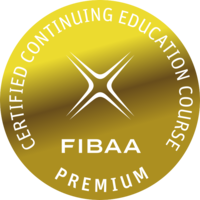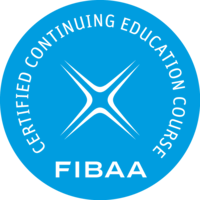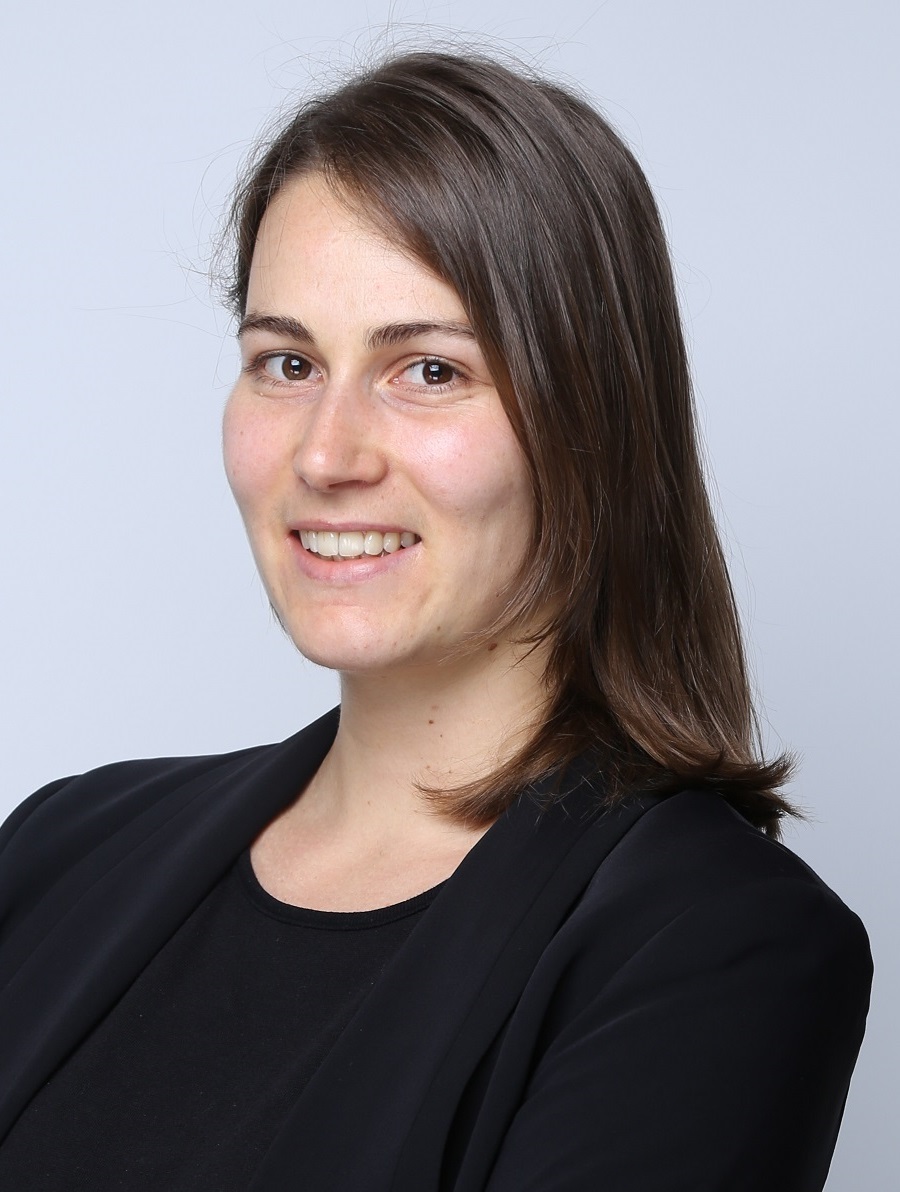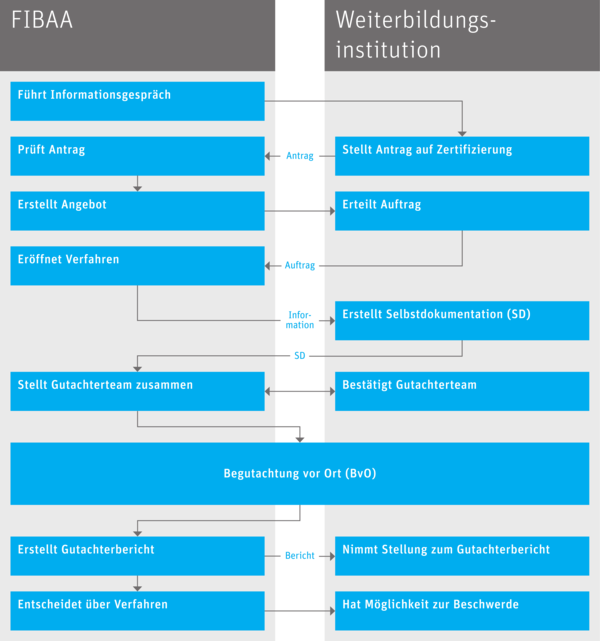-
You are a Higher Education Institution or a provider of continuing education,
-
you offer continuing education courses that do not lead to an academic degree (e.g. compact courses, certificate courses, micro-credentials) and
-
you would like to position your continuing education offer within the system of international academic quality standards.
-
an internationally recognised quality seal for your continuing education courses,
-
an expert evaluation of your assessment according to the European Qualifications Framework (EQF),
-
an expert assessment of the implementation of the guidelines of the European Credit Transfer and Accumulation System (ECTS) as well as the European Standards and Guidelines for Quality Assurance (ESG), in order to promote transparency and comparability on the continuing education market,
-
extensive and elaborated assessment reports, which highlight the strengths of the certified courses and micro-credentials and identify potential for their further development,
-
an outstanding expertise in the assessment of continuing education courses,
-
a special focus on employability and practical economic relevance and
-
a service-oriented, efficient and flexible procedure (4 – 6 months).
⠀
Objectives of the procedure
A FIBAA certification gives you detailed information and provides you with objective evidence on the quality of your continuing education courses. We evaluate the following five key issues:
-
Objectives and positioning of the course
-
Focus on the target group
-
Contents, structure, didactical concept and methodology of the course
-
Academic environment and framework requirements
-
Documentation, quality assurance and quality development
A further objective of the certification procedure of FIBAA is to improve recognition of prior learning and access to further academic studies.
1. Compatibility with academic education
The FIBAA Quality Seal for certified continuing education courses documents the high academic level of your courses and its compatibility with academic education. With the certification, you can document the level of knowledge and skills imparted and the compatibility with academic degree programmes. You can thus offer your graduates further qualification prospects. We base our assessment of the courses on the European Qualification Framework (EQF), the European Credit Transfer and Accumulation System (ECTS) as well as the European Standards and Guidelines for Quality Assurance (ESG).
3. Recommendations and incentives for the further development of your courses
You receive detailed assessment reports with clear recommendations how to improve and further develop your continuing education courses. We want to support you in strengthening the profile of your courses and integrate the latest developments in knowledge, the occupational field and didactics.
4. Specialist expertise
Our expertise lies in the certification of continuing education courses in the field of management studies, economics, law and the social sciences. Our experts are accomplished academics, experienced professionals, knowledgeable national experts and committed students. We also take the special didactic features and organisational requirements of face-to-face, distance, cooperative and executive education into account in our procedures and provide proven experts for these.
5. Long-term international experience
Since our establishment in 1994, we have helped a large number of European and non-European Higher Education Institutions and other education providers to assure and further develop the quality of their courses. With the FIBAA Quality Seal you will achieve a recognised quality rating, which has established itself on the international education market as an award for high quality.
6. Individual support
We support you at every stage of the certification procedure - from the first contact to the planning and organisation of the site visit until the final decision on certification. You receive all relevant information and documents you need for a successful certification. A project manager of FIBAA will support you during the entire process.
7. User-friendliness
Direct links to all the sources of law, external standards and further documents and sample templates ensure comprehensive transparency and offer you the best possible assistance when satisfying the requirements of a certification.
8. FIBAA Premium Seal
We are the only agency, which awards a Premium-Seal for certified continuing education courses. We use this in particular to single out established courses, which have already registered graduates and display excellent quality. With this award we give prospective students, students, graduates, providers of higher education and prospective employers reliable information about the excellent quality of the course.
FIBAA Premium Seal for certified continuing education courses

We are the only quality assurance agency, which awards a FIBAA Premium Seal for certified continuing education courses, which have demonstrated their outstanding quality. It provides prospective students, students, graduates, other providers of higher education as well as employers with reliable orientation on the outstanding quality of the continuing education course.
Information about the Principles for Awarding the FIBAA Premium Seal for certified continuing education courses are available here.
FIBAA Quality Seal for certified continuing education courses

For continuing education courses, which have successfully been certified according to our quality standards, we award the FIBAA Quality Seal for certified continuing education courses. This seal confirms the high quality and the academic level of your course.
1. Inquiry
For initial information and so that we can give you a tailor-made quotation, we ask you to complete and return our Application form. We can then provide you with a non-binding quotation and discuss the desired timetable for the certification procedure with you. Before the application is made, we are happy to inform you in a preparatory discussion about the content and work stages of the certification procedure.
3- Appointment of the FIBAA Expert Team
As soon as you have submitted the self-evaluation report, we will nominate a FIBAA project manager as your contact and appoint a review panel, which generally consists of at least four experts: two from the field of academia, one expert from professional practice and one student. In order to ensure that the review panel is unbiased, FIBAA will give you the opportunity to submit any reasonable appeal. We will prepare our FIBAA Experts for your area of activity and every actual procedure.
5. Compiling the report
The review panel then prepares a comprehensive assessment report in which all quality requirements are documented in a comprehensible manner.
The quality requirements are based on the Standards and guidelines for quality assurance in the European Higher Education Area (ESG).
You can write a statement on this assessment report. Both documents – the assessment report and your statement – will be submitted for final decision-making to the FIBAA Accreditation and Certification Committee F-ACC.
2- Compiling the self-evaluation report
After the procedure has started, you will compile your self-evaluation report (including the relevant appendices) on the basis of our Assessment Guide for the certification of continuing education courses, which gives a detailed description of all the relevant quality standards.
4. Site visit
After reading through your self-evaluation report and before appointing the review panel, we will agree a date with you for a site visit, which usually takes one day. This helps to acquire information about your institution and verify your self-evaluation report through discussions with the management of the institution, teaching staff, students, administrative staff and other relevant groups in your institution.
6. Decision-making
On the basis of the report, the decision recommendation of the review panel and by taking account of your opinion, the Members of the FIBAA Accreditation and Certification Committee (F-ACC) will reach a decision about your application for certification. Afterwards the full report is published on the FIBAA homepage.
The duration of a certification in the case of an initial certification is 5 years; in the case of a re-certification, it is 7 years.
Throughout the accreditation process, we will be at your service – even in case of necessary improvement measures.
Read more about the Complaints procedure.
In order to support you with the certification procedure according to our quality standards, we have developed an assessment guide for the certification of continuing education courses, which contains all relevant quality standards in form of questions and definitions of the benchmarks. This document serves you as the basis for generating your self-evaluation report.
All our quality criteria consider the distinctive features of continuing education courses, for eample by taking into account the professional experience of the course participants, the respective qualifications of the teaching staff and the high flexibility of continuing education courses in comparison with study programmes.
In order to promote international comparability and to facilitate the recognition of the acquired credit points and access to academic study programmes, we base our work on the principles of the Bologna Process (e.g. modularisation, award of credit points, etc.). Our assessment guide is in line with the following quality standards:
FIBAA Accreditation and Certification Committee
President
- Prof. Dr. Peter Thuy, IU International University
Vice President
- Prof. Dr. Vera de Hesselle, Bremen University of Applied Sciences
- Dr. Markus A. Tomaschitz, Chairman of the Supervisory Board of FH JOANNEUM
Other members
Representatives from academia
- Prof. Dr. Andreas Altmann, University of Innsbruck and MCI Management Center Innsbruck
- Prof. Dr. Axel Benning, Bielefeld University of Applied Sciences
- Prof. Dr. Volker Hasewinkel, VICTORIA | International University of Applied Sciences
- Prof., dipl. Ing. ETH, lic. oec. publ. Jürg Kessler, University of Applied Sciences Graubünden
- Prof. Dr. Ruedi Nützi, School of Business of the University of Applied Sciences Northwestern Switzerland
- Prof. Dr. Sabine Remdisch, Leuphana University of Lüneburg
- Prof. Dr. Wolfgang Renninger, East Bavarian Technical University Amberg-Weiden
- Prof. Dr. Ottmar Schneck, SRH Fernhochschule Riedlingen - The Mobile University
- Prof. Dr. Johann Schneider, former Frankfurt University of Applied Sciences
- Prof. Dr. John Slof, UAB - Autonomous University of Barcelona
- Prof. Em. Dr. György Széll, University of Osnabrück
- Prof. Dr. Jürgen Weigand, WHU Otto Beisheim School of Management, Vallendar
- Prof. Dr. Cornelia Zanger, Chemnitz University of Technology
Representatives from professional practice
- Karl-Peter Abt, former Managing Director of the IHK
- Dr. Bernd Baasner, formerly of Bayer AG
- Dr. Ivo Matser, CEO of the IEDC Bled School of Management in Slovenia and CEO of the Academy of Business in Society (abis-global), Brussels
- Hans-Hellmuth Retzlaff-Schröder, Lufthansa AG
- Kerstin Wagner, Deutsche Bahn AG
- Dr. Mathias Winde, Donors' Association for the Promotion of Sciences and Humanities in Germany
Representatives from the student body
- Elisa Knief, Student at the University of Bremen
The amended Rules of Procedure of the FIBAA Accreditation and Certification Committee (F-ACC) as of 26 November 2021 can be found here.
The dates for the next meetings of the FIBAA Accreditation and Certification Committee are available here.
The FIBAA Expert Committee
The FIBAA Expert Committee for programme accreditation, institutional accreditation and certification appoints experts for each accreditation or certification procedure. The F-ACC elects two university representatives, one practice representative and one student from among its members to the FIBAA Expert Committee.
Members of the Panel Appointing Committee:
-
Student body: Marie-Luise Meier, as substitute: Ms. Knief
-
Science: Prof. Schneider, Prof. Széll, as substitute: Prof. Altmann and Prof. Remdisch
-
Career practice: Karl-Peter Abt, as substitute: Kerstin Wagner
How long does a certification process take?
The certification process usually takes four to six months from the submission of the self-evaluation to the decision of the FIBAA Accreditation and Certification Committee (F-ACC). After the conclusion of the contract, FIBAA will contact you to agree upon a suitable schedule with you.
What standards are used in the programme accreditation and certification processes?
-
European Qualifications Framework for Lifelong Learning (EQF) / German Qualifications Framework for Lifelong Learning (DQR)
These are summarised in the FIBAA Assessment Guide for the certification of scientific continuing education and certificate courses.
What are the requirements for FIBAA Certification?
The FIBAA certification is aimed at higher education institution and non-higher education institution providers of continuing education. Relevant eligibility criteria are:
- the courses should receive an ECTS accreditation recommendation for a possible subsequent academic qualification.
- ideally, the principle of modularisation has already been implemented in the courses or is aimed for within a maximum of 18 months (see ECTS guidelines).
According to which specifications should we create the self-evaluation?
For certification of continuing education courses, create your self-evaluation based on the FIBAA Assessment Guide for the certification of continuing education courses. This document contains all relevant quality standards in the form of questions and benchmarks.
By when should the self-evaluation report be submitted to FIBAA?
Submit your self-evaluation no later than one year after signing the contract.
In what form should we submit the self-documentation to FIBAA?
FIBAA requires a copy in digital form (e.g. sharepoint, download link, zip files).
What happens after submitting our self-evaluation?
After submitting the self-evaluation, FIBAA will appoint a project manager who will take over the coordination of the process and will be available to you as a contact partner for the duration of the entire process. The project manager will schedule the assessment in consultation with you. The relevant FIBAA Panel Appointing Committee appoints an Assessor Team.
After the self-evaluation has been checked for completeness by FIBAA, the review panel will check it for consistency, plausibility and conformity with the respective guidelines and specifications. This is followed by the assessment.
How are the Assessors chosen?
The assessment of continuing education courses follows along the lines of the "Peer-Review" process proven in the academic field: Independent reviewers, selected in accordance with disciplinary criteria, check and assess the objective facts and circumstances with you as equals. A strict FIBAA Criteria System hereby assures unbiased and comprehensible expertise at all times.
In principle, the review panel consists of at least four people, two of them from science (university or technical college professors), one from professional practice (company representative) and one student member. Depending on the subject of assessment, these may be expanded to include certain expertises.
FIBAA has a pool of more than 750 recognised assessors.
FIBAA bases the appointment of Assessor Teams on a number of requirements, which also include knowledge of accreditation processes. FIBAA therefore regularly offers training courses and seminars for its pool of assessors.
You will be informed of the composition of the Assessor Team in due time. In order to ensure the impartiality of the Assessor Team, FIBAA gives you the opportunity to make a reasoned objection. However, the higher education institution has no right of proposal or veto.
How is the assessment organised?
The assessment takes place at the higher education institution or continuing education site, digitally or a mix of the two, over 1 to 2 days by arrangement depending on the number of continuing education courses to be certified and the space available.
The review panel obtains a comprehensive picture of the continuing education course(s) and the involvement of all those involved through discussions with the higher education institution management, the teaching staff, the students, the graduates and the administrative staff.
The Assessor Team then prepares an assessment report with a decision recommendation. This report is the basis for the decision of the FIBAA Certification Committee for Continuing Education Courses.
How often do the FIBAA Committees meet?
The FIBAA Certification Committee for Continuing Education Courses meets approximately twice a year, depending on requirements. The dates will be announced here on the FIBAA homepage. As a rule, when submitting the self-evaluation, we agree with you on the desired time to refer the matter to the FIBAA Certification Committee for Continuing Education Courses.
What decisions can the FIBAA Certification Committee take?
The FIBAA Certification Committee can either decide to:
-
certify the continuing education course without any condition,
-
certification with conditions, or
-
refuse the certification.
Before the decision of the FIBAA Committees, you will receive the assessment report without the assessor decision recommendation. All decisions of the FIBAA Committees are made on the basis of your opinion.
For what duration are the continuing education courses certified?
-
Initial certification: five years
-
Re-certification: seven years
In the case of certification with conditions, the duration of the certification may be shortened.
What happens after a positive certification decision?
After a positive certification according to the FIBAA quality standards, you will receive the FIBAA quality seal for the continuing education courses. The certification results, the names of the assessors involved and the complete reports (taking into account the data protection requirements) are published on the FIBAA homepage (certified continuing education courses).
What happens after a negative certification decision?
If certification of a continuing education course is denied, a new certification can be applied for after a blocking period of one year.
What happens in the case of an certification with conditions?
Within the deadline set by the FIBAA Committee (usually 9 months), you must provide evidence of compliance with the agreed condition(s) by email to auflagen[at]fibaa.org. When fulfilling conditions, please note the handout on fulfilling conditions, which we will be happy to send you with the decision of the FIBAA Committee and upon request.
Your submitted evidence will be checked directly by the assessors in the case of content-related requirements, and in the FIBAA office in the case of formal requirements. On the basis of the opinion of the assessors and/or the office, the responsible FIBAA Committee decides on the fulfilment of the condition (s).
If the fulfilment of the requirement cannot be proven on time, you may, in justified cases, request a one-time extension of the deadline (max. 6 months). Otherwise, FIBAA is obliged to withdraw the certification for the continuing education course after issuing a reminder and setting a reasonable grace period.
In which case does FIBAA award the FIBAA Premium Seal?
FIBAA awards the FIBAA Premium Seal to continuing education courses that have already established themselves on the market and that demonstrate excellent quality in study and teaching as part of a certification process in accordance with the international quality standards of FIBAA. This award confirms that a continuing education course is of outstanding quality overall. It gives prospective students, students, graduates, higher education institutions, continuing education institutions and the job market reliable orientation about the quality of the continuing education course.
Information on the principles for awarding the FIBAA Premium Seal can be found here:
Can changes be made to a continuing education course that has already been certified?
Changes to a certified continuing education course are possible and are expressly desired as continuous improvement and updating.
If these changes are of a significant nature (e.g. new higher education institution / institution location, new specialisation, change in the name of the continuing education course) and affect the conception or profile of a continuing education course, they must be disclosed to FIBAA.
FIBAA then checks whether the changes could reduce the quality and whether a new assessment would then be necessary. FIBAA decides whether the process may be shortened in individual cases and e.g. a telephone conference with the higher education institution / continuing education institution or an assessment based on written documents is also possible.
If you are unsure whether a change needs to be disclosed, FIBAA will be happy to answer any questions you may have at info@fibaa.org.
Can the accreditation be withdrawn? If so, in which cases?
In some cases, FIBAA is obliged to withdraw the certification (after issuing a reminder and setting a deadline). This is the case,
-
if the higher education institution / continuing education institution does not meet the requirements within the specified period or
-
the higher education institution / continuing education institution does not notify the accreditation agency of notifiable changes, although these substantially affect the basis of the original accreditation.
Germany
Universität Augsburg, Zentrum für Weiterbildung und Wissenstransfer
ADI Academy of Real Estate Economics in Stuttgart, Frankfurt, Munich, Hamburg, Berlin and Leipzig, in Co-operation with Baden-Wuerttemberg Cooperative State University (DHBW)
Management-Academy of the Sparkassen-Financegroup, Bonn
Saxonian Administrative and Economic Academy (VWA), Dresden
Verwaltungs- und Wirtschaftsakademie München, e.V.
Sparkassenakademie Nordrhein-Westfalen
MLP Corporate University, Wiesloch
Renewables Academy (RENAC) AG
Kasachstan
KIMEP University in Almaty, Executive Education Center, Kasachstan
Nordzypern
Eastern Mediterranean University, School of Computing and Technology, Famagusta
Schweiz
USA
Coursera Inc.
We look forward to your enquiry
FIBAA stands for reliable support in quality development.
We look forward to walking the path together with you.
Please send us your enquiry.
Please contact us!
Division Manager Certifications

M.A.
Phone: +49 (0) 151 / 16840282
E-Mail: stephan@fibaa-nospam.org
Languages: German, English
Deputy Division Manager

M.Sc.
Phone: +49 (0) 151 / 585 805 37
E-Mail: butler@fibaa-nospam.org
Languages: German, English, Spanish

